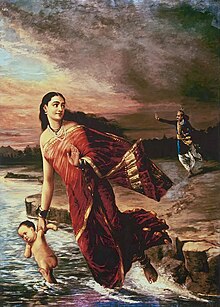Bhishma
Appearance

Bhishma (Devanāgari: भीष्म) is a major character in the Hindu epic Mahabharata, and is well-known for his pledge of celibacy. Bhishma was the disciple of Bhagavan Parashurama (one of the avatārs of Lord Vishnu).
Quotes
[edit]- My oath is not for myself. My dharma is far beyond my own selfishness and more important than your life. Forgive me for what has happened if you can. You may remain here in our city for the rest of your life and your every comfort will be seen to. But as for marrying you, Amba, that I cannot do.
- Bhishma in: The Mahabharata: A Modern Rendering (2006), by Ramesh Menon, p. 31
- I will never have children. I am incapable of having children now. Does this satisfy you?
- Bhishma in: Mahabharat Ep7: Devavrata Becomes Bhishma (4 August 2015), by Sadhguru Jaggi Vasudev. Retrieved 9 September 2017.
- "Bhishma said: That man who wishes to increase his own flesh by the meat of another living creature is such that there is none meaner and more cruel than he. In this world there is nothing that is dearer to a creature than his life. Hence, one should show mercy to the lives of others as he does to his own life. Forsooth, O son, flesh has its origin in the vital seed. There is great sin attached to its eating, as, indeed, there is merit in abstaining from it.
- Bhishma in: Mahabharata, Anu.116.11-13
- "Hence a person of purified soul should be merciful to all living creatures. That man, O king, who abstains from every kind of meat from his birth forsooth, acquires a large space in the celestial region. They who eat the flesh of animals who are desirous of life, are themselves [later] eaten by the animals they eat. This is my opinion. Since he has eaten me, I shall eat him in return. This, O Bharata, forms the character as Mamsah [meaning flesh] of Mamsah [me he, or "me he" will eat for having eaten him]. The destroyer is always slain. After him the eater meets with the same fate.
- Bhishma in: Mahabharata, Anu.116.32-35
- "Abstention from cruelty is the highest Religion. Abstention from cruelty is the greatest self-restraint. Abstention from cruelty is the highest gift. Abstention from cruelty is the highest penance. Abstention from cruelty is the highest sacrifice. Abstention from cruelty is the highest power. Abstention from cruelty is the greatest friend. Abstention from cruelty is the greatest happiness."
- Bhishma in Mahabharata, Anu.116.38-39
Quotes about Bhishma
[edit]- They called him Bhishma, one who was terribly harsh on himself, without anyone forcing him to take such a step.
- Sadhguru Jaggi Vasudev in: Mahabharat Ep7: Devavrata Becomes Bhishma
- Krishna was meditating, when Yudhishtra approached Him and asked Him of whom He was thinking. The Lord replied that He was thinking of Bhishma, the best of His devotees, and the one who was always thinking of Him. How great should a person be to have himself described in such glowing terms by the Lord Himself!
- Greatness of Bhishma (5 May 2013), The Hindu. Retrieved 9 September 2017.
